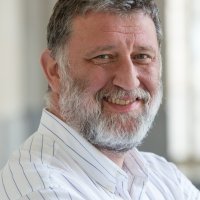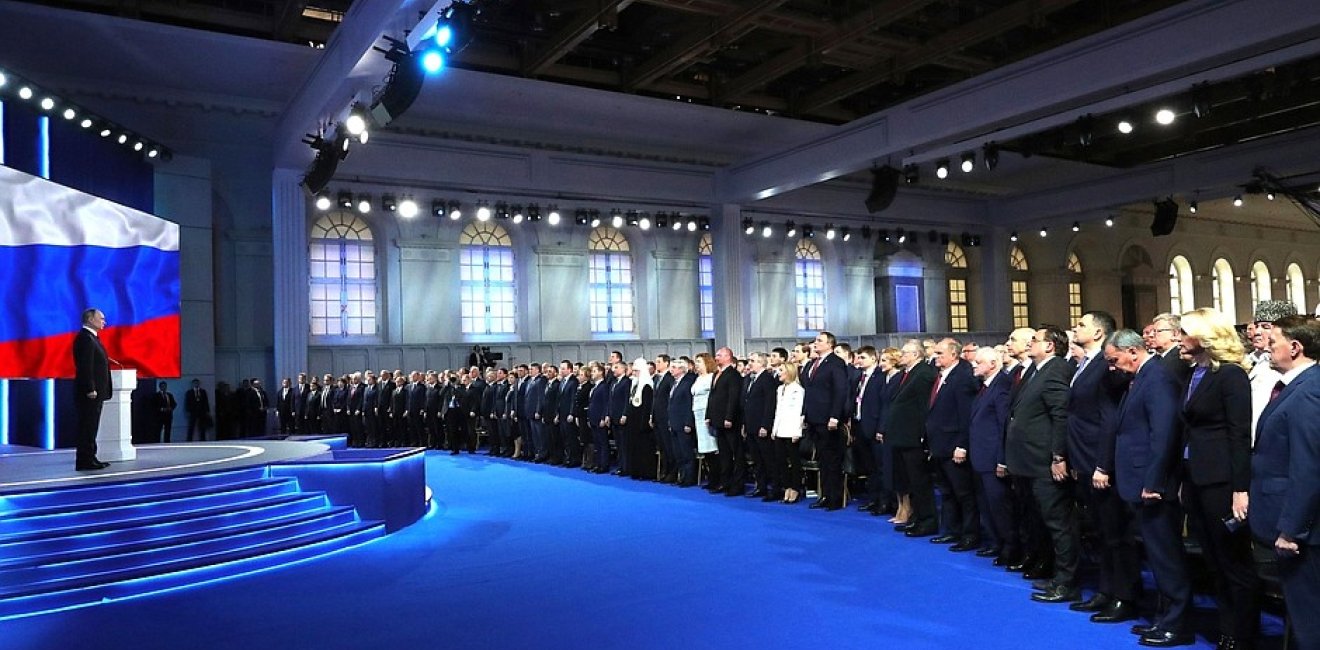
A blog of the Kennan Institute
This article is an abridged and edited translation of this Russian-language original.
BY SERGEY PARKHOMENKO
As President Vladimir Putin wound up his annual address to the Federal Assembly, many Russian analysts and political commentators breathed a sigh of relief: relief that a long-standing problem showed signs of finally being resolved as Putin’s intentions came more fully into view.
The general consensus among Russians was that on January 15, Putin presented to the nation his chosen path for securing his grip on political power in Russia into the indefinite future. There is ample room for doubt, however, as to whether he actually did so.
Let’s review.
In the several months preceding the address, most analysts had come together around three such possible paths. In their view, Putin could:
- Declare himself president for life by imposing pertinent constitutional amendments on the Duma and wider Russian society;
- Create and occupy some supranational office by incorporating Russia and some other former Soviet territory (most likely Belarus) into a single entity through personal, economic, or military coercion; or
- Construct a personal power citadel within existing Russian governmental structures, effectively depriving the next Russian president of many current powers, and perhaps even abolishing the presidency as such.
In the immediate aftermath of Putin’s speech, many analysts, attending to Putin’s careful wording, were still under the impression that Russia’s president was taking steps to shift the center of power from the presidential office elsewhere and to relocate there himself.
However, a closer look at President Putin’s bombshell announcements reveals no good reason to draw such an unequivocal conclusion. Let us examine what Putin said and what the analysts think he said.
Leave the presidency?
There are three pronouncements from the Kremlin that Russia observers have used to buttress their argument that President Putin communicated an intention to leave the presidency in the spring of 2024, when his current mandate ends, or possibly even sooner. They point out that:
- Putin stated that “it is desirable to enshrine in the constitution the status and function of the State Council”—the very State Council that he himself resurrected in 2000 as an advisory body made up of regional governors, the speakers of both parliamentary chambers, and other high-ranking Russian officials.
- Putin announced that he plans to reduce the scope of presidential powers by transferring some of them to the two chambers of the Russian parliament and others to the above-mentioned State Council.
- Putin spoke in favor of removing the magic word “consecutive” from the constitutional provision that restricts the presidential term to “two consecutive terms.” (It was precisely this word that allowed him to spend two terms as president in 2000–2008 and then, after swapping jobs temporarily with Dmitry Medvedev, happily to resume the presidency for another two terms starting in 2012.)
Let’s examine each of these.
Putin’s phrasing about State Council leaves a lot of room for interpretation. True, it is possible to enshrine the State Council in the constitution and promise to define its purpose and responsibilities at some later date with a separate law. But why should anyone expect that it is this council that will become the center of power for Russia’s “paramount leader”? As of now, he himself has said nothing of the kind. Constitutional amendments meant to accommodate the change were introduced on Monday, January 20, but the big question remains unanswered.
The plan to shrink the presidential powers is not a particularly convincing argument either. It seems that in one part of his speech, Putin expressed his intention to transfer to the Duma the right “to appoint the Prime Minister … and all deputy prime ministers and federal ministers at the Prime Minister’s recommendation.” In the same breath he said that the president “will have no right to turn down the candidates approved by the parliament.” Yet in the very next paragraph he proposed giving the president—himself—the right to dismiss the prime minister, the prime minister’s deputies, and the federal ministers “for loss of trust”—that is, on a whim. What is the value of a presidential responsibility to approve the government appointed by the Duma if it is accompanied by another right to withdraw the approval five minutes later and any number of times, in perpetuity? The amendments introduced on Monday did not provide clarity on the issue.
Things get even more absurd when we get to the constitutional restriction on the number of presidential terms related to that special word consecutive. Putin first touched on the topic of two consecutive terms back in December at his annual press conference. He returned to it in his January speech, noting offhandedly that he did not consider the issue of major significance. Left unclear was exactly which part of the elocution was not of principal significance for him. Many analysts decided that he meant the “consecutive” part, when it is just as likely that he meant the part about “two terms”—meaning that a lifetime presidency could very well be in the offing.
Which part of the constitution to rewrite?
Back in December, Putin also said that only the first chapter of the Russian constitution was untouchable—the one that lays out the foundations of the constitutional order. “Everything else can be changed in principle, in one way or another,” he said somewhat casually, noting that all the potential changes were a matter of taste. The recent address finally gave us an idea of what his tastes are.
It is to his taste to endow Duma deputies with a right to dismiss the Constitutional Court and Supreme Court judges at their discretion—even though Article 10 of the constitution establishes the separation of legislative, executive, and judicial powers and their independence from one another.
It is to his taste to do away with what he referred to as the “gap” between federal and municipal powers in Russia by constructing some sort of “unified system of public authority”—even though Article 12 of the constitution clearly states that in Russia, municipal powers are not the same as federal and do not belong in the same system.
It is also to his taste to prevent from running for political office not only those with dual citizenship but also those who have held long-term visas to work or study abroad—even though Article 19 of the constitution guarantees “equality of rights and freedoms” to all Russian citizens, including the right to elect and be elected.
To be clear, these three articles of the constitution—Articles 10, 12, and 19—which, per President Putin’s newly revealed tastes, are subject to review, are part of the very section of the constitution he had earlier referred to as untouchable.
Meanwhile, it is as still too early for Belarusian president Alexander Lukashenko to exhale. Just because President Putin has decided to hastily rewrite the constitution doesn’t mean that he won’t also take up the scenario of unification with a neighboring state. The above-mentioned constitutional innovations would work just as well if Putin were to become, say, the lifelong chair of the Supreme State Council overseeing a new unified state. Moreover, there is no reason to think that Putin’s territorial ambitions would be limited to Belarus. Abkhazia, Transnistria, South Ossetia, and even, if the stars align just so, the Donbas could find themselves part of some kind of a hastily slapped-together semi-imperial entity, with Putin as its lifelong ruler.
The same is true for the scenario of extending presidential powers for life. A rewritten constitution would make it even easier by relieving the eternal leader from the last checks and balances, however meaningless.
Don’t worry about the constitution!
Here is the only thing we know for sure: the current Russian constitution has ceased to exist, and no longer provides a foundation for the legal order in Russia. No later than this spring, the entire set of constitutional changes will be adopted as a package in a mysterious procedure dubbed “the popular vote.” (No, this will not be a referendum: that procedure is too expensive, lengthy, and scrupulously legislated.) Until then, Russian law will no longer bother to comply with this or that constitutional provision. Why worry about it when the constitution is about to be changed anyway? Who needs the limitations codified in this antiquated document that no longer interests anyone?
Indeed, not one person in the entire Russian power vertical seemed to be flustered when the newly dismissed prime minister, Dmitry Medvedev, was appointed deputy chair of the Russian Security Council—four hours before the legal act establishing this office was introduced in the Duma. The law will take several weeks to adopt, yet Medvedev will spend all the intervening time occupying an influential official position that does not exist.
The Russian constitution is dead. What happens next remains to be seen.
Author

Journalist, publisher, organizer of civic projects

Kennan Institute
After more than 50 years as a vital part of the Wilson Center legacy, the Kennan Institute has become an independent think tank. You can find the current website for the Kennan Institute at kennaninstitute.org. Please look for future announcements about partnership activities between the Wilson Center and the Kennan Institute at Wilson Center Press Room. The Kennan Institute is the premier US center for advanced research on Eurasia and the oldest and largest regional program at the Woodrow Wilson International Center for Scholars. The Kennan Institute is committed to improving American understanding of Russia, Ukraine, Central Asia, the South Caucasus, and the surrounding region through research and exchange. Read more

Explore More in The Russia File
Browse The Russia File
Chechnya as a Model of Modern Russia

Russia’s Indigenous Communities and the War in Ukraine

Gas and Power in a Changing US–Russia Relationship

